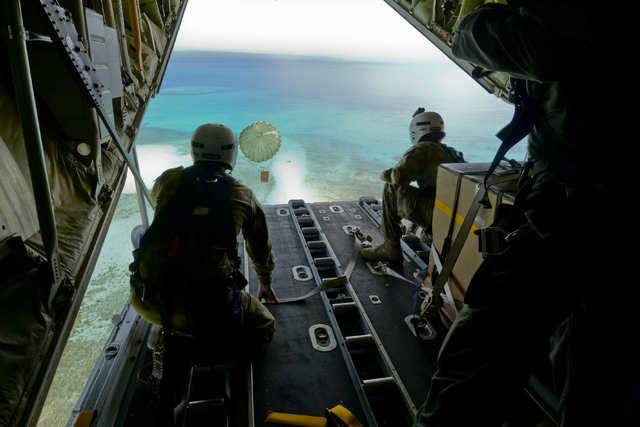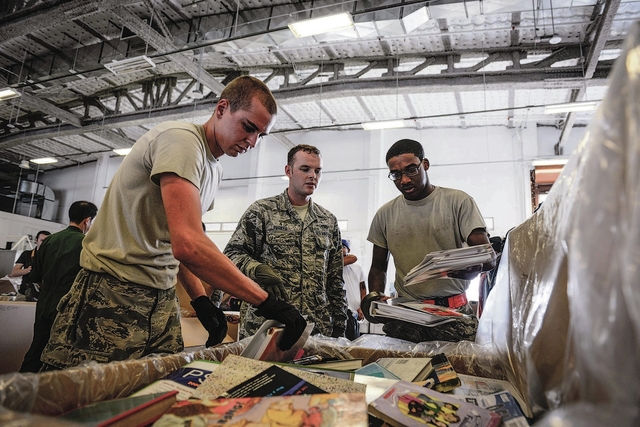U.S. crews, Pacific allies drop food, toys on atolls

COURTESY U.S. AIR FORCE VIA AP
Cpl. Teome Matamua and Sgt. Phillip McIllvaney of Australia’s 176th Air Dispatch Squadron deliver a package to the island of Mogmog in the Federated States of Micronesia.

COURTESY U.S. AIR FORCE VIA AP
Airmen at Andersen Air Force Base in Guam packed donated books earlier this month in preparation for Operation Christmas Drop.


Australian, Japanese and U.S. warplanes are dropping food and toys on remote atolls in the Pacific as part of the U.S. military’s longest-running humanitarian relief mission.
The packages will go to 20,000 people across 56 islands in Micronesia, the Mariana Islands and Palau.
The U.S. Air Force began the annual Operation Christmas Drop in 1952 when a Guam-based air crew noticed residents on the island of Kapingamarangi waving at them as they flew overhead. The crew gathered items they had on the plane, attached a parachute and dropped them to the islanders.
It’s a feel-good mission that also helps the U.S. achieve political aims, namely deepening three-way cooperation with close allies Australia and Japan, who are first-time participants. Analysts say the United States has been bolstering the trilateral relationship in recent years as it keeps an eye on China’s growing military.
The boxes include books, canned food and items like fishing nets that will help islanders maintain their largely subsistence lifestyle. This year each package will also include a soccer ball.
Many islands are tiny. Fais Island, for example, has just 300 inhabitants. It’s less than 2 miles long and a mile wide.
Don't miss out on what's happening!
Stay in touch with breaking news, as it happens, conveniently in your email inbox. It's FREE!
The planes fly low, look for a safe spot to drop the bundles, then release them from the back of the C-130s.
“It’s from 300 feet and 130 knots, but you feel a kinship with these folks when you see them on the ground waving,” said Col. Douglas C. DeLaMater, commander of the U.S. Air Force’s 374th Airlift Wing.
University of Guam distance education staff use ham radios to talk to the islanders throughout the year and relay their needs. Most recipient islands are the same each year.
U.S. Air Force Brig. Gen. Gregory Guillot, director of strategic plans at Pacific Air Forces, said the Christmas Drop offers a good trilateral training opportunity, particularly in a time of budget constraints and busy units.
Japan and Australia each sent one C-130 to join three from the U.S.
5 responses to “U.S. crews, Pacific allies drop food, toys on atolls”
Leave a Reply
You must be logged in to post a comment.





[…] Sourced through Scoop.it from: http://www.staradvertiser.com […]
I did that when stationed on Guam in the early 60’s. The wives would have fund raisers and take donations, make little parachutes and we’d fly over Truk and vicinity at low level and throw them out of the open bomb bays of the WB-50’s. There would be untold numbers of people and kids waving as we dropped. It gave that “feel good” for everybody for the Holiday season.
Sounds like the start of a new cargo cult.
No, they have been a cargo cult for years.
Drop some homeless people there?